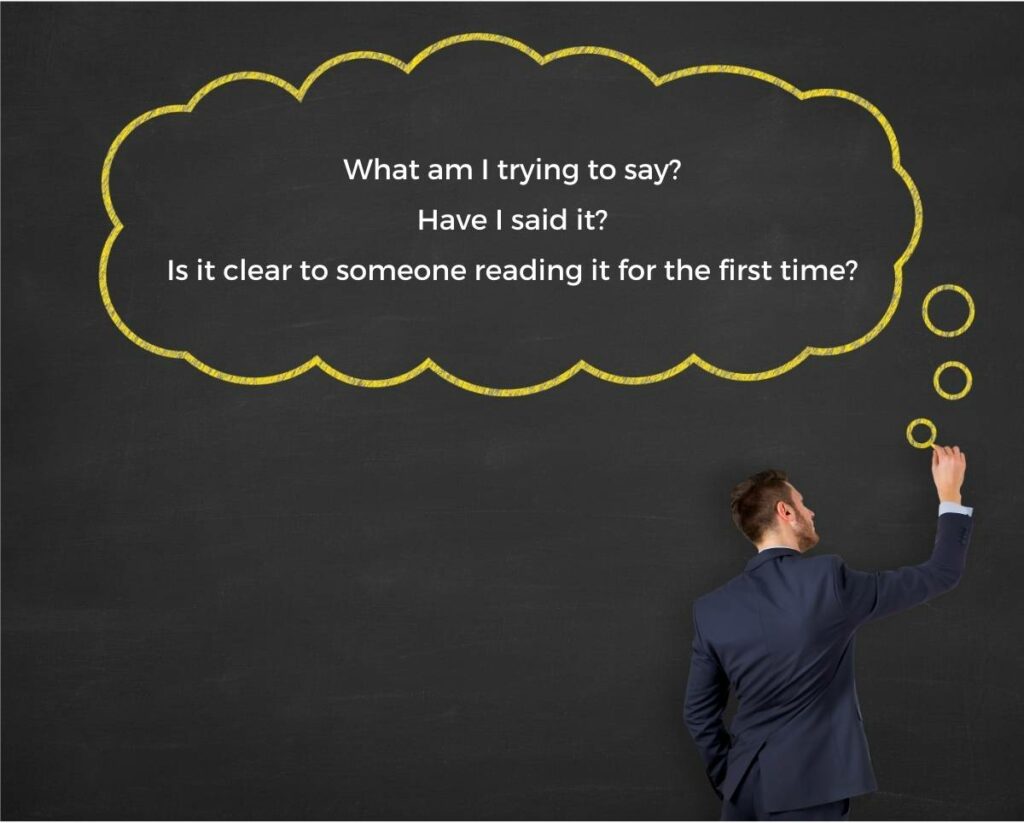

With all the communication tools available to us, there is still massive mutual mystification when it comes to clearly understanding each other.
Many factors contribute to that, including the languages people speak in our diverse workforce. A US Census report on findings from 2009-2013 found that sixty million Americans speak languages other than English at home, and those sixty million speak some 300-plus different languages.
Even if you are a native English speaker, you have to work at being understood, as writer David Burge puts it, “Yes. English can be weird. It can be understood through tough thorough thought, though.”
Nowhere can miscommunication affect you as much as in the written word. Whether text, email, group chat or Pony Express letter, the written word has an impact and permanence that can negatively affect your career and your reputation.
Or if you’re proficient in reader-centered business writing, it can help you build stronger connections, communicate effectively and efficiently, and enhance your reputation.
When you write an email, the recipient is (surprise!) not a computer. You are always addressing a person on the other end of your correspondence and it’s important to treat them like one.
Yes, you are communicating information, but you are also building a connection.
A well-written message makes a powerful first impression: the opposite is true for a poorly written message. People can’t hear your tone of voice or read your body language so your writing style is going to speak volumes. The impression that you give comes down to who you are, what you have to say, and your consideration of, respect for, and knowledge of the recipient.
People who feel valued, encouraged, seen, and respected will respond better to what you have to say and will be more likely to help you and remember you favorably.

When I asked people what they found most irritating about email, many of the answers came down to how they were treated by the other person. Here’s a sampling of what people found frustrating.
There’s a lot more that’s irritating about email (and text and group messaging), but many of the problems people had came down to a lack of courtesy and connection. People want to be treated as people, even in the shortest of messages.
It’s much harder to connect warmly with someone when you can’t look them in the eyes, smile, and shake their hands. But it is possible. Here are some suggestions on making reader-centered business writing personal.
This may seem strange to you, but consider smiling when you type, and imagining that the recipient is in front of you. Why?
Because people sense your attitude and using an optimistic, good-natured, and gracious tone encourages a prompt response. You’re much more likely to write graciously if you are actively thinking about the person on the other end.
As a bonus, your coworkers will see your expression as you type and it will help your reputation as someone who is pleasant to be around.
When corresponding, be sure to address the recipient by name. It may seem simple, but people love the sounds of their own name and they will feel more connected.
If possible, start your message with something individual to the other party—reference his family, a mutual friend, hobbies or interests, or some accomplishment. That one-to-one personalization is akin to a connecting “touch,” and it reduces the remoteness between you.
You are you-centered (and so is everyone else!) so make it a general rule of thumb to eliminate “I” language as much as possible, especially in the first paragraph. This communicates to the reader that you value them and encourages them to keep reading.
For instance, try saying “You are the best person to answer this question” or “You were highly recommended by” instead of “I wanted to ask you a question,” or “I hear you are the person to speak to about.”
Do you feel the difference? It’s a slight change, but it makes a world of difference in how the other person perceives the message…and you!
You will stand out from everyone else who “just wants something” and are more likely to get help, information, etc… In fact, one recruiter told me if she reads more than five first-person singular pronouns in one e-mail, it automatically goes into the trash.

This really should go without saying, but think about what is best for the other person. You really shouldn’t send an urgent request five minutes before they are going on vacation if you can help it. Nor should you send them unnecessary emails just because it’s easy to copy everyone in the department.
Lengthy, rambling emails are not only unlikely to be read, but you are assuming your recipient has the time to read through everything. If your email is turning into a novella, consider a phone call. (And do you really need to send them an email when they are two offices down?) At the same time, you don’t have to be curt or rude. And certainly, don’t share their personal information without their consent!
Basically, apply the golden rule to your written communication: Write (and forward) unto others as you would have them write (and forward) unto you.

You want your reader to feel connected to you, but you also want them to understand what you are communicating. You may have complimented the reader, remembered their dog’s name and made sure to send your request in a timely manner, but if they have to re-read your email five times before your message makes sense, you’ve probably lost them. They’re frustrated and you are less likely to get the help you need.
In short, your writing needs to be clear and focused for the sake of the reader and yourself.
Clear writing is a result of clear thinking. My writing mentors taught me a simple 3-step test to use,whether it’s an email, a proposal, or a book. I suggest using this test not just after each completed piece, but after each paragraph, even each sentence:
This 3-step test can help you clarify what you’re trying to say.
Following that simple test, I’ve found that my writing improves in direct ratio to the number of things I keep out that shouldn’t be there. One useful tool for applying this test to your writing is to go back and read what you’ve written out loud
Reading your written words out loud causes mistakes to ring in your own ear. You may catch a small or large one and save yourself some embarrassment.
I’ve added one more question to the test my mentors taught me:
4. Why should the reader care; what’s in it for them?
This last question is to nudge the reader’s curiosity along to continue reading. The author of On Writing Well, William Zinsser, says #4 is to cajole with freshness, or novelty, or paradox, or humor, or purpose — with an unusual idea, an interesting fact, or a question — something to make the reader smile and linger on what you wrote.
Of course, you should also keep an eye out for spelling and grammar mistakes. Auto-correct doesn’t catch everything. Even in brief emails, use complete sentences, and use correct spelling, grammar, and punctuation. In fact, write better than your high school English teacher would approve of
Some things should not be communicated in writing, no matter how much easier it makes it for you .
It can be easy to hide behind the keyboard when you don’t want to deal with an individual directly. It’s sort of like the anonymity driving a car gives you. You slip in behind the wheel, barrel down the road, and brazenly honk your horn or flip someone the bird. These are acts you would never do if you were looking that person in the eyes.
Similarly, hiding behind your computer screen, your boldness builds. As you hide from sight, you do not have to talk directly to the person, so you feel that you are not truly accountable.
But the truth is you are accountable for those things.
Don’t send or forward anything with potentially libelous, sexist, racist, or profane comments or images in it, and never, ever give bad news or tough feedback through email, text, or Slack first. Have the courage to tell the person in person or at least on the phone (not via voice mail). Don’t lay-off an employee via text or tell your boss you’re quitting with an email.
Reader-centered business writing focuses on the reader, but the results benefit the writer (ie. YOU). Even the most mundane message when written in a clear and direct way with humanity and warmth will cause people to always want to read what you wrote and be more likely to positively respond. You will build better relationships and get more done more quickly because you took the time to communicate well.
If you need help communicating more effectively or are facing a challenge in your career, I am here to help. Contact me to discuss executive coaching, or if you have a group of emerging leaders, for a speaking engagement.

Order at Amazon or wherever books are sold.